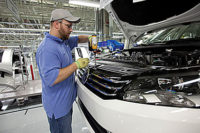Green Manufacturing Can Be Profitable

Tesla is one of many manufacturers in Clean200 list of green publicly traded companies. Photo courtesy Tesla Inc.
Just a few years ago, much of the business community viewed climate advocates with indifference, skepticism or even outright hostility. Today, however, companies representing 40 percent of the global stock market have committed to science-based targets for reducing their greenhouse gas emissions in line with the Paris Agreement. In many cases, these businesses are already making billions of dollars supplying climate-friendly products and services. Even corporations that are less directly implicated in the economic upside of climate action recognize the imperative for a low-carbon economy because no business can profit in an environment of climate chaos.
Meeting the goals of the Paris Agreement will requirement investment. Indeed, by one estimate, we will need at least $4 in clean energy investment for every $1 maintaining fossil fuels. The good news is that over the past decade, the flow of money into clean energy and efficiency infrastructure has tripled to about $1 trillion annually. Global investments in clean energy transition reached $1.1 trillion in 2022—roughly equal to the amount invested in fossil fuel production in the same year.
To further encourage such investment, As You Sow, a nonprofit shareholder advocacy group, has put together the Clean200, an educational tool intended to give individuals the ability to research companies that are balancing people, planet and profit. The Clean200 are the world’s largest 200 public companies ranked by clean revenue.
The Clean200 companies are ranked by their clean revenues in U.S. dollars. They were chosen from a pool of 6,720 global companies. To be eligible, a company must earn more than 10 percent of total revenues from clean sources. The Clean200 excludes oil, gas and coal companies; weapons manufacturers; companies implicated in deforestation; companies that use child or forced labor; companies involved in the manufacture of harmful pesticides; and companies that engage in negative climate lobbying.
Geographically, the Americas and Europe account for 38.5 percent and 31.5 percent, respectively, of this year’s Clean200, while the remaining 60 companies are headquartered in the Asia Pacific region. The United States dominated the list, with 42 companies. China had the second-largest share with 21, followed by Japan, which is headquarters to 16 Clean200 companies.
On average, 58.3 percent of revenues earned by Clean200 companies are classified as sustainable, representing close to $2.4 trillion all totaled. In contrast, just 5 percent of the revenues from companies in the Morgan Stanley Capital International All Country World Index (ACWI) can be classified as sustainable. (The ACWI is a stock index designed to track broad global equity-market performance. The index comprises the stocks of nearly 3,000 companies from 23 developed countries and 25 emerging markets. Fund managers use it as a guide for asset allocation and a benchmark for the performance of global equity funds.)
Of note, it was found that on average, 44.4 percent of the capital expenditure, acquisitions, and research and development expenses among the Clean200 companies were defined as sustainable, compared to only 7 percent among ACWI constituents.
Of the 2023 Clean200 companies, the information technology sector accounted for nearly a quarter of the total sustainable revenue at $586 billion, followed by the communications services sector ($542 billion) and the industrials sector ($400 billion). Thirteen of the top 20 are manufacturing companies: Apple Inc., Tesla Inc., TSMC, HP Inc., Contemporary Amperex Technology Co., Schneider Electric, Cisco Systems Inc., Intel Corp., Nucor Corp., Siemens AG, CRRC Corp., Unilever and Vestas.
U.S. companies had, on average, the highest sustainable revenue at $23 billion. This is followed by Germany with $18 billion and South Korea at $17 billion.
None of these numbers would have legs if the Clean200 weren’t also faring well financially. On this score, as of Jan. 31, 2023, the Clean200 has outperformed its ACWI peers by 3.36 percent since it was launched in July 2016. Clean200 companies generated a total return of 91.21 percent, beating the ACWI (87.84 percent), as well as Morgan Stanley’s index of fossil fuel companies (61.31 percent). To put that in context: $10,000 invested in the Clean200 on July 1, 2016, would have grown to $19,121 by Jan. 31, 2023, vs. $18,784 for the ACWI and $16,131 for the fossil fuel index.
Read the report for yourself here.
Looking for a reprint of this article?
From high-res PDFs to custom plaques, order your copy today!





